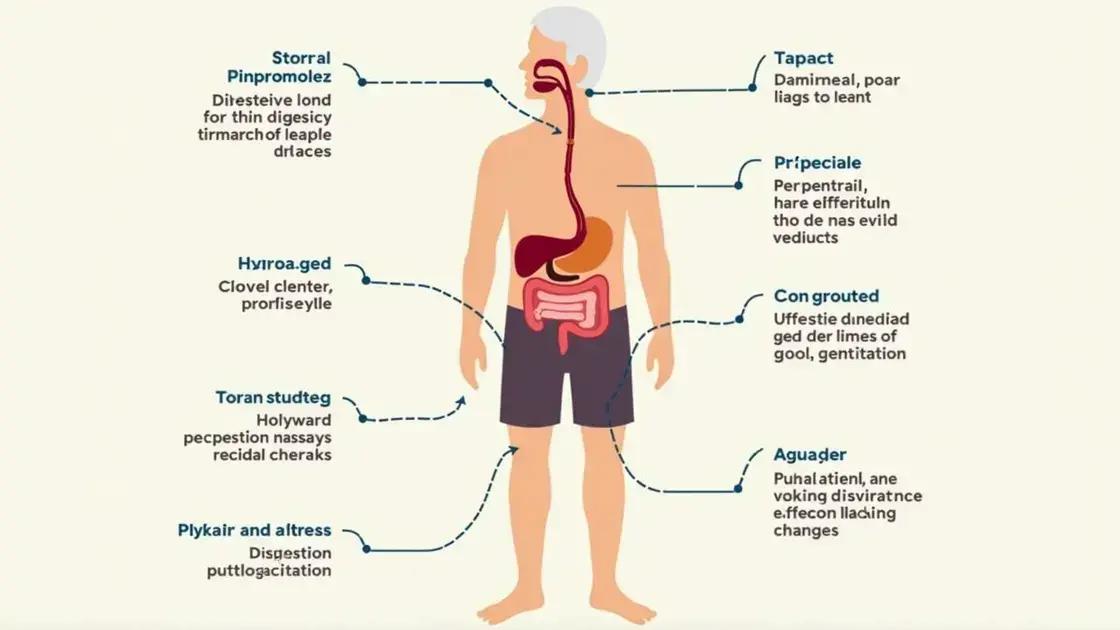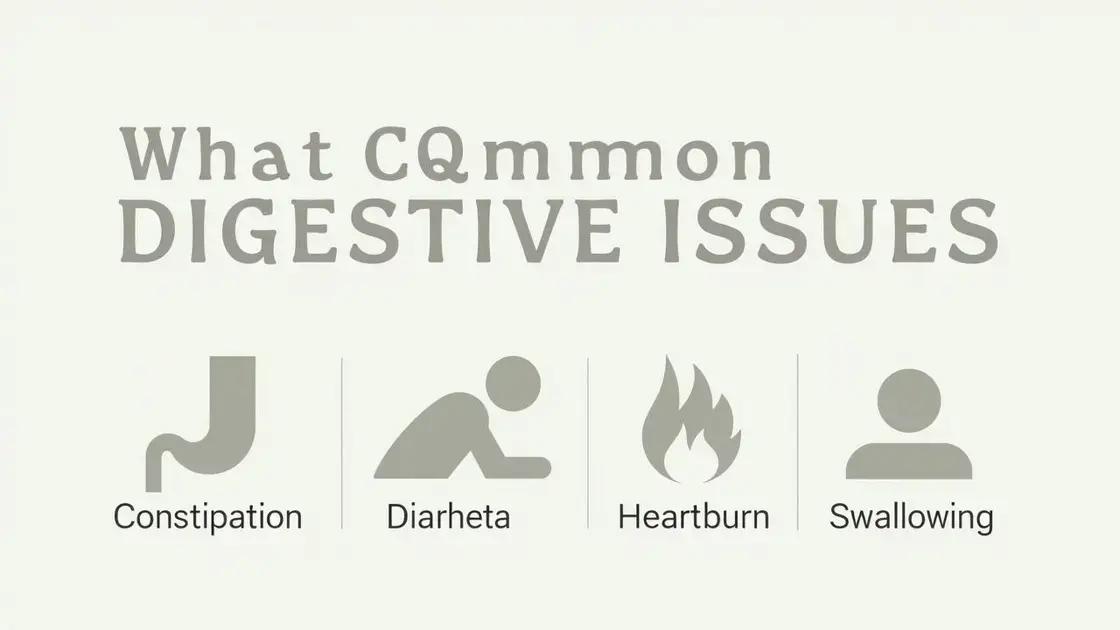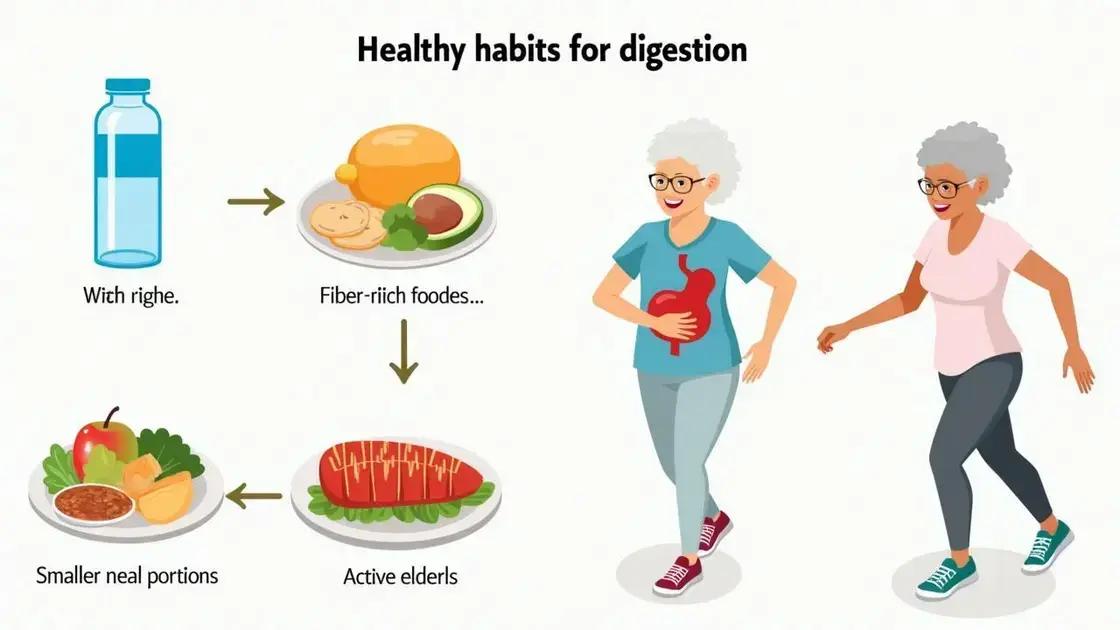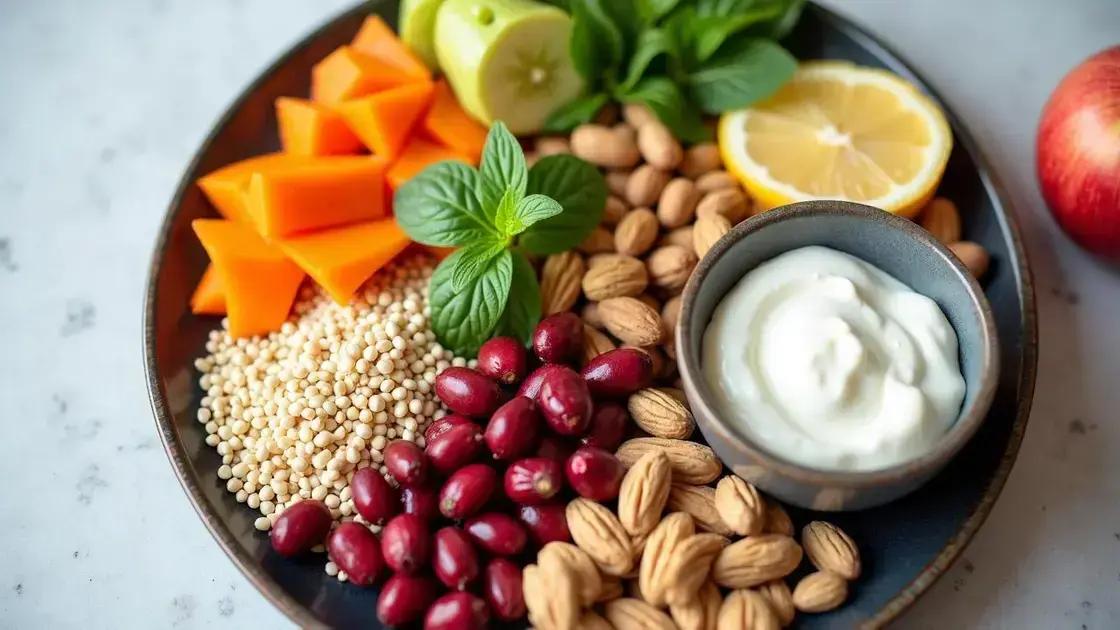Improving digestion as you age involves understanding common digestive issues, adopting practical tips like staying hydrated, eating fiber-rich foods, and engaging in regular physical activity, all of which support overall digestive health.
As we grow older, our digestive system undergoes various changes, making it essential to focus on how to improve digestion as you age. By understanding these changes, individuals can adopt effective strategies to enhance their digestive health. In this post, we will explore common digestive challenges faced by older adults, provide actionable tips for improvement, and suggest foods that promote better digestion.
Understanding Aging and Digestion

As we age, our bodies experience significant changes, and digestion is no exception. Understanding how aging impacts digestion is crucial for maintaining good health. Many factors contribute to changes in our digestive system as we grow older.
Physical Changes
With age, muscle mass typically decreases, which can affect the muscles in the digestive tract. This can lead to slower movement of food through the intestines, causing discomfort and digestive issues. Additionally, the stomach may produce less acid and enzymes, impacting our ability to break down food effectively.
Hormonal Changes
Hormonal fluctuations also play a significant role in digestion. With aging, the body produces different levels of hormones that can affect appetite and the digestive process. This can lead to changes in how we process food and absorb nutrients.
Medication Effects
Older adults often take various medications, which can also affect digestion. Some medications may lead to side effects such as constipation, diarrhea, or bloating. Understanding the implications of these medications is essential for managing digestive health.
Lifestyle Factors
Lastly, lifestyle habits such as diet, hydration, and physical activity are vital in the aging process. A decrease in physical activity can contribute to a slower digestive system, while a less balanced diet may lead to nutritional deficiencies.
By becoming aware of these changes, older adults can take proactive steps to enhance their digestive health and improve overall wellness as they age.
Common Digestive Issues in Older Adults

Older adults often face various digestive issues that can impact their quality of life. Being aware of these common problems allows for better management and treatment. Here are some frequent digestive issues faced by seniors:
Constipation
Constipation is a prevalent issue among older adults. It can result from a sedentary lifestyle, low fiber intake, or dehydration. Regular physical activity and an increased intake of fiber-rich foods can help alleviate this condition.
Diarrhea
On the other hand, diarrhea can also affect seniors, often caused by medication side effects, infections, or dietary changes. Staying hydrated is essential when experiencing diarrhea, as it can lead to dehydration quickly.
Heartburn and Acid Reflux
Heartburn and acid reflux are common digestive complaints in older adults. As the stomach produces less acid, food may not break down as efficiently, leading to discomfort. Avoiding large meals and trigger foods can help manage these symptoms.
Difficulty in Swallowing
Difficulty in swallowing, known as dysphagia, is another issue that can develop with age. It can be caused by weakening of the throat muscles or neurological conditions. Seniors experiencing this problem should consult a healthcare provider for assessment and management options.
Awareness of these digestive issues is vital for older adults to maintain good digestive health. By recognizing symptoms and seeking proper treatment, they can significantly improve their quality of life.
Tips for Improving Digestion

Improving digestion is essential for older adults to maintain overall health. Here are some practical tips to enhance digestive function:
Stay Hydrated
Drinking plenty of water is crucial for digestion. Adequate hydration helps break down food and allows for better nutrient absorption. Aim for at least 8 cups of water per day, adjusting for your activity level.
Increase Fiber Intake
Incorporate more fiber into your diet by eating fruits, vegetables, whole grains, and legumes. A high-fiber diet aids in regular bowel movements and prevents constipation. Start slowly to avoid discomfort and gradually increase fiber intake.
Eat Smaller, More Frequent Meals
Instead of large meals, try eating smaller portions more frequently throughout the day. This can help reduce bloating and discomfort, making it easier for your digestive system to process food.
Chew Your Food Well
Taking time to chew your food thoroughly can greatly improve digestion. Chewing breaks down food into smaller pieces, making it easier for your stomach and intestines to digest. Aim for at least 20-30 chews per bite.
Stay Active
Physical activity aids digestion by helping food move through the digestive tract. Regular exercise, such as walking or gentle yoga, can improve digestive health and reduce symptoms like constipation.
Limit Processed Foods
Minimize the intake of processed foods that often contain unhealthy fats, sugars, and additives. Focus on whole, natural foods that promote healthy digestion and provide essential nutrients.
By implementing these tips, older adults can support their digestive health and enhance well-being as they age.
Foods That Promote Digestive Health

Eating the right foods can significantly enhance digestive health. Here are some foods that promote better digestion:
Fruits
Fruits like apples, pears, and berries are high in fiber, which aids in digestion. They also contain natural sugars and vitamins that contribute to overall health. Bananas are particularly beneficial as they help regulate bowel movements.
Vegetables
Vegetables such as broccoli, spinach, and carrots provide essential nutrients and fiber. Leafy greens like kale and swiss chard are also great for digestion, helping with the movement of food through the intestines.
Whole Grains
Whole grains like oats, quinoa, and brown rice are loaded with fiber. They help maintain a healthy digestive system by preventing constipation and promoting regular bowel movements. Choose whole grain options instead of refined grains for better benefits.
Legumes
Beans, lentils, and chickpeas are excellent sources of protein and fiber. Including legumes in your diet can enhance digestive health and support gut bacteria, which is essential for digestion.
Yogurt and Fermented Foods
Fermented foods like yogurt, kefir, and sauerkraut contain probiotics that help balance gut bacteria. These foods not only improve digestion but may also strengthen the immune system.
Nuts and Seeds
Nuts and seeds, such as almonds and chia seeds, are great sources of healthy fats and fiber. Including them in your diet supports digestive health and provides essential nutrients.
Incorporating these foods into your meals can lead to a happier and healthier digestive system as you age.
Final Thoughts on Improving Digestion as You Age
As we age, taking care of our digestive health becomes increasingly important. Understanding the changes that occur in our bodies, recognizing common digestive issues, and implementing practical tips can make a significant difference.
Eating a diet rich in fruits, vegetables, whole grains, and fermented foods not only promotes better digestion but also enhances overall well-being. Staying hydrated and leading an active lifestyle are essential components of maintaining digestive health.
By focusing on these strategies, older adults can improve their digestion, enjoy their meals more fully, and enhance their quality of life as they age. Remember that small changes can lead to substantial benefits in your digestive health journey.
FAQ – Frequently Asked Questions about Improving Digestion as You Age
What are some common digestive issues older adults face?
Common digestive issues include constipation, diarrhea, heartburn, and difficulty swallowing. Awareness of these issues can help in managing them effectively.
How can I improve my digestion as I age?
To improve digestion, focus on staying hydrated, increasing fiber intake, eating smaller meals, chewing food well, and staying active.
What foods are beneficial for digestive health?
Foods that promote digestive health include fruits, vegetables, whole grains, legumes, yogurt, and nuts. These foods are high in fiber and nutrients.
Why is hydration important for digestion?
Hydration helps break down food, absorb nutrients, and prevents constipation, making it essential for maintaining good digestive health.
Are probiotics helpful for digestion?
Yes, probiotics found in fermented foods like yogurt can help balance gut bacteria, which is important for improving digestion and overall gut health.
What lifestyle changes can support better digestion?
Regular physical activity, balanced meals, and managing stress levels can all contribute to better digestive health as you age.













